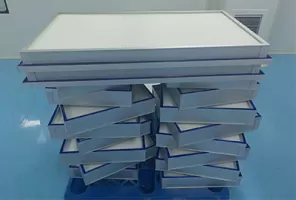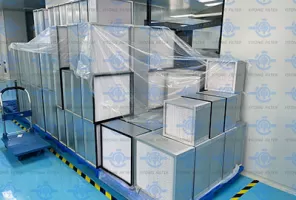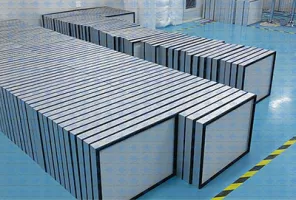 November 14, 2023
November 14, 2023
I. Introduction
A. Significance of the pharmaceutical industry
The pharmaceutical industry plays a pivotal role in global health by researching, developing, and producing life-saving medications. Its significance is underscored by the constant need for high-quality pharmaceuticals to combat diseases and improve public health.
B. Importance of air quality in pharmaceutical production
In the pharmaceutical sector, maintaining optimal air quality is paramount. Airborne contaminants can jeopardize the safety, efficacy, and purity of pharmaceutical products. As such, stringent measures are required to ensure a controlled environment throughout the manufacturing process.
C. Overview of HEPA filters
High-Efficiency Particulate Air (HEPA) filters are a cornerstone in achieving and maintaining the required air quality standards in pharmaceutical production. These advanced filters are designed to capture and remove particles as small as 0.3 microns with high efficiency. In this article, we will explore the crucial role HEPA filters play in safeguarding pharmaceutical production environments and the numerous benefits they offer in ensuring product quality.
II. Working Principle of HEPA Filters
A. Definition and standards of HEPA
HEPA, or High-Efficiency Particulate Air, filters are a specialized type of air filter designed to meet stringent standards for air purification. According to industry standards, HEPA filters must capture at least 99.97% of particles with a size of 0.3 microns or larger. This high level of efficiency ensures that even the tiniest airborne contaminants are effectively removed from the air.
B. Structure and materials of HEPA filters
HEPA filters are constructed using a multi-layered approach to maximize their effectiveness. The filter typically consists of a dense arrangement of fiberglass fibers or other synthetic materials. These fibers create a maze-like structure that traps particles as air passes through the filter. The filter material is pleated or folded to increase the surface area, allowing for greater particle capture.
The frame of the HEPA filter is crucial for maintaining structural integrity and preventing air bypass. It is commonly made of aluminum or other materials that are resistant to corrosion and can withstand the rigors of pharmaceutical production environments.
C. Mechanism of capturing particles
The mechanism by which HEPA filters capture particles is based on several principles, including interception, impaction, and diffusion. As air flows through the filter, particles are either intercepted by the fibers, impacted and captured due to the filter's physical structure, or slowed down and diverted from their original path, leading them to collide with filter fibers.
The combination of these mechanisms ensures that HEPA filters can effectively capture particles of various sizes, including bacteria, viruses, and other contaminants present in pharmaceutical production environments. The intricate design and high-quality materials of HEPA filters make them a cornerstone in maintaining the required air cleanliness standards essential for pharmaceutical manufacturing processes.
III. Air Quality Requirements in the Pharmaceutical Industry
A. GMP standards and air quality regulations
In the pharmaceutical industry, adherence to Good Manufacturing Practice (GMP) standards is imperative to ensure the production of safe and effective medications. GMP regulations include stringent guidelines for air quality to prevent contamination during the manufacturing process. These standards dictate the types of air filtration systems that must be in place, with HEPA filters being a common requirement to achieve the necessary cleanliness levels. Compliance with GMP standards is not only a regulatory obligation but also a fundamental aspect of guaranteeing the quality and integrity of pharmaceutical products.
B. The criticality of microbiological control
Microbiological control is a cornerstone of pharmaceutical production, and maintaining a controlled environment is crucial to prevent the introduction of harmful microorganisms. Airborne contaminants, such as bacteria and fungi, pose a significant risk to the production of sterile pharmaceuticals. HEPA filters play a pivotal role in microbiological control by effectively capturing and removing airborne microorganisms. The ability of HEPA filters to provide a sterile environment is essential for processes such as aseptic filling and packaging, where any microbial contamination can compromise the quality and safety of pharmaceutical products.
C. Impact of airborne particles on pharmaceutical processes
Airborne particles, even those invisible to the naked eye, can have a profound impact on pharmaceutical processes. These particles can introduce impurities, affect product stability, and compromise the efficacy of medications. HEPA filters, with their high efficiency in capturing particles, help mitigate these risks by providing a controlled and clean air environment. The reduction of airborne particles not only ensures product quality but also minimizes the likelihood of batch rejection, thereby optimizing production efficiency and minimizing economic losses.
Adhering to strict air quality requirements is non-negotiable in the pharmaceutical industry. By addressing GMP standards, emphasizing microbiological control, and recognizing the impact of airborne particles on pharmaceutical processes, industry professionals can appreciate the pivotal role that HEPA filters play in maintaining the integrity of pharmaceutical products and the overall success of manufacturing operations.
IV. Application of HEPA Filters in Pharmaceutical Production
A. Key areas in pharmaceutical manufacturing
1. **Pharmaceutical equipment**
HEPA filters find extensive application in various pharmaceutical equipment to prevent the introduction of contaminants during critical manufacturing processes. Equipment such as granulators, tablet presses, and filling machines are equipped with HEPA filters to ensure the air used in these processes is free from particles that could compromise the quality of the final product.
2. **Cleanrooms and controlled environments**
Cleanrooms, with their stringent air quality requirements, are integral to pharmaceutical manufacturing. HEPA filters play a central role in maintaining the required cleanliness levels in cleanrooms. These controlled environments are designed to minimize the presence of airborne particles, and HEPA filters, strategically placed in air handling units, help achieve and sustain the necessary air quality standards essential for the production of sterile pharmaceuticals.
3. **Drug packaging areas**
Maintaining a clean environment is equally critical in drug packaging areas. HEPA filters are installed in packaging machinery and surrounding spaces to prevent the introduction of contaminants during the final stages of pharmaceutical production. This ensures that the packaged medications remain free from impurities, adhering to the highest quality standards.
B. Installation and maintenance of HEPA filters
1. **Proper layout and design considerations**
The effective application of HEPA filters relies on proper layout and design considerations. The placement of filters within pharmaceutical facilities should be strategically planned to ensure optimal airflow and coverage. This includes considering factors such as air exchange rates, the positioning of manufacturing equipment, and the layout of cleanrooms. A well-designed system enhances the efficiency of HEPA filters in capturing and removing airborne particles, contributing to the overall success of pharmaceutical production.
2. **Regular testing and replacement protocols**
Ensuring the continued efficacy of HEPA filters requires a comprehensive approach to maintenance. Regular testing, through methods such as particle counting and airflow velocity measurements, is essential to monitor filter performance. Additionally, adhering to strict replacement protocols is crucial. Over time, HEPA filters can become saturated with captured particles, leading to a decline in efficiency. Establishing a routine schedule for filter replacement helps maintain consistent air quality standards, safeguarding pharmaceutical production processes from potential risks associated with contaminated air.
The application of HEPA filters in pharmaceutical production is multifaceted, encompassing critical areas such as equipment, cleanrooms, and packaging spaces. Proper installation, coupled with vigilant maintenance practices, ensures that HEPA filters contribute effectively to the production of high-quality and contamination-free pharmaceuticals.
V. Impact of HEPA Filters on Product Quality
A. **Efficient microbiological control**
Microbiological control is a critical aspect of pharmaceutical manufacturing, particularly in processes that involve the production of sterile medications. HEPA filters contribute significantly to efficient microbiological control by capturing and removing airborne microorganisms. The dense structure of HEPA filters prevents the passage of bacteria, viruses, and other contaminants, ensuring a sterile environment crucial for the production of aseptic pharmaceuticals. The use of HEPA filters in cleanrooms and controlled environments minimizes the risk of microbial contamination, safeguarding the integrity and safety of pharmaceutical products.
B. **Reduction of particle contamination**
HEPA filters excel in reducing particle contamination, playing a pivotal role in maintaining the cleanliness levels required for pharmaceutical production. The filters effectively capture particles as small as 0.3 microns, including dust, pollen, and other airborne particulate matter. This reduction in particle contamination is vital for ensuring the quality and purity of pharmaceutical products. By minimizing the presence of impurities, HEPA filters contribute to the production of medications that meet the highest standards of efficacy, safety, and patient well-being.
C. **Compliance with regulations and quality standards**
Adherence to regulations and quality standards is non-negotiable in the pharmaceutical industry. HEPA filters provide a reliable means of achieving and maintaining the air quality standards mandated by regulatory authorities. Compliance with Good Manufacturing Practice (GMP) regulations and other quality standards is essential for pharmaceutical manufacturers to demonstrate the safety and efficacy of their products. HEPA filters, by effectively controlling microbiological contamination and reducing particle levels, contribute significantly to meeting these stringent regulatory requirements. As a result, pharmaceutical companies can confidently produce medications that comply with industry regulations, ensuring the highest level of product quality.
The impact of HEPA filters on product quality in the pharmaceutical industry is profound. Through efficient microbiological control, the reduction of particle contamination, and adherence to regulations and quality standards, HEPA filters play a pivotal role in safeguarding the integrity, safety, and efficacy of pharmaceutical products. Their implementation is not merely a regulatory necessity but a fundamental aspect of ensuring that the medications produced meet the highest standards of quality and reliability.
VIII. Conclusion
A. **Summary of the Importance of HEPA Filters in the Pharmaceutical Industry**
In conclusion, the role of HEPA filters in the pharmaceutical industry is indispensable. These filters serve as a frontline defense against airborne contaminants, playing a crucial role in maintaining the high air quality standards required for pharmaceutical production. From efficient microbiological control to the reduction of particle contamination, HEPA filters contribute significantly to ensuring the integrity, safety, and efficacy of pharmaceutical products. Their application in key areas such as equipment, cleanrooms, and packaging spaces underscores their versatility and importance in various stages of the manufacturing process. The stringent adherence to Good Manufacturing Practice (GMP) standards and other regulatory requirements is facilitated by the effective implementation of HEPA filters, making them an integral component of pharmaceutical quality assurance.
B. **Prospects for Future Developments**
Looking ahead, the future of HEPA filters in the pharmaceutical industry holds promising developments. Continued advancements in filter materials, design, and technology are expected to enhance their efficiency and effectiveness further. Innovations in sensor technology and real-time monitoring systems may provide pharmaceutical manufacturers with more robust tools to ensure the optimal performance of HEPA filters. Additionally, a growing emphasis on sustainability in the pharmaceutical sector may lead to the development of eco-friendly filter materials and energy-efficient filtration systems. As pharmaceutical production processes evolve, HEPA filters will likely continue to evolve alongside them, contributing to even higher levels of air quality control and product quality assurance.
In conclusion, the continued reliance on HEPA filters in the pharmaceutical industry is not only a current necessity but also a foundation for future advancements that will further elevate the standards of air quality and product quality in pharmaceutical manufacturing.
 May. 13, 2024
The Importance of HEPA Filters in Ventilation Systems
May. 13, 2024
The Importance of HEPA Filters in Ventilation Systems
 Nov. 22, 2024
Importance of Filters in Return Air Vents
Nov. 22, 2024
Importance of Filters in Return Air Vents
 Aug. 22, 2024
Comprehensive Guide to HEPA H14 Filter
Aug. 22, 2024
Comprehensive Guide to HEPA H14 Filter